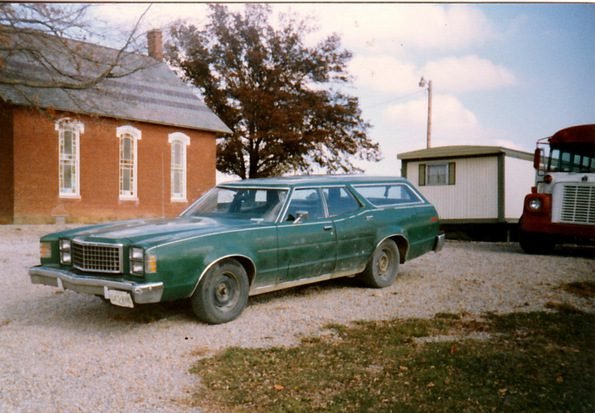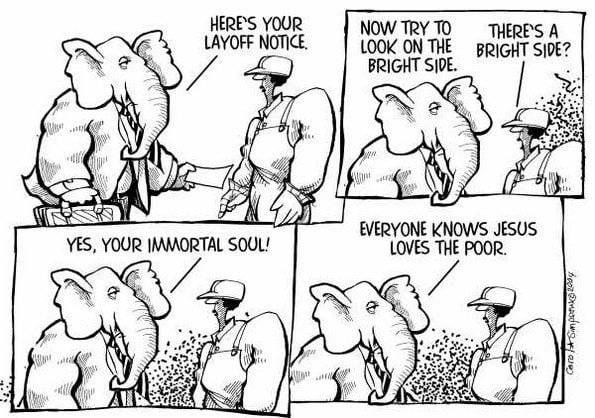
These and other verses were the guiding principles of my life for many years:
Then said Jesus unto his disciples, If any man will come after me, let him deny himself, and take up his cross, and follow me. Matthew 16:24
Lay not up for yourselves treasures upon earth, where moth and rust doth corrupt, and where thieves break through and steal: But lay up for yourselves treasures in heaven, where neither moth nor rust doth corrupt, and where thieves do not break through nor steal: For where your treasure is, there will your heart be also. Matthew 6:19-21
No man can serve two masters: for either he will hate the one, and love the other; or else he will hold to the one, and despise the other. Ye cannot serve God and mammon. Therefore I say unto you, Take no thought for your life, what ye shall eat, or what ye shall drink; nor yet for your body, what ye shall put on. Is not the life more than meat, and the body than raiment? Behold the fowls of the air: for they sow not, neither do they reap, nor gather into barns; yet your heavenly Father feedeth them. Are ye not much better than they? Which of you by taking thought can add one cubit unto his stature? And why take ye thought for raiment? Consider the lilies of the field, how they grow; they toil not, neither do they spin: And yet I say unto you, That even Solomon in all his glory was not arrayed like one of these. Wherefore, if God so clothe the grass of the field, which to day is, and to morrow is cast into the oven, shall he not much more clothe you, O ye of little faith? Therefore take no thought, saying, What shall we eat? or, What shall we drink? or, Wherewithal shall we be clothed?(For after all these things do the Gentiles seek:) for your heavenly Father knoweth that ye have need of all these things. But seek ye first the kingdom of God, and his righteousness; and all these things shall be added unto you. Take therefore no thought for the morrow: for the morrow shall take thought for the things of itself. Sufficient unto the day is the evil thereof. Matthew 6:24-34
For the love of money is the root of all evil: which while some coveted after, they have erred from the faith, and pierced themselves through with many sorrows. 1 Timothy 6:10
I was a Baptist. Not just any old generic, run-of-the-mill Baptist either. I was an Independent, Fundamentalist, the-Bible-is-the-inspired-inerrant-infallible-Word-of-God Baptist. There were five things that every good Baptist church member was expected to do:
- Read the Bible every day
- Pray every day
- Attend church every time the doors of the church were open
- Witness
- Tithe and give offerings
I will come back to the last of these, tithe and give offerings, in just a moment, but before I do I need to write a bit about how I looked at life in general.
I was a committed follower of Jesus. I believed God spoke to me individually through the Bible, prayer, and the still, small voice of the Holy Spirit. I believed that God led me or directed me to do certain things. It was important to “wait on the Lord.” and NOT trust my own understanding. My life verse was Proverbs 3:5-6:
Trust in the Lord with all thine heart; and lean not unto thine own understanding. In all thy ways acknowledge him, and he shall direct thy paths.
I knew God had saved me and called me to the ministry. For every church I ever pastored, I believed God led me to that specific congregation. It is important to understand this point because this line of thinking permeated my entire thought process.

When a small church came calling and wanted me to be their pastor, I never concerned myself with how much they could pay me. I thought, “If God wants me to pastor this church, he will make a way for me to do it.” As a result, I developed a willingness to live in poverty if it meant doing what God had called me to do. No matter how much suffering and difficulty it caused me or my family, the only thing that was important was being in the center of the will of God. I now see that God’s will was actually my own will and that the passivity that led me to “wait on God” wreaked financial havoc in our lives – such that we have not recovered from to this day.
The most I ever made as a pastor was $26,000 a year. Most years, my pay was more in the $10-12,000 range. I never had health insurance or any of the work-related benefits that almost every church member had. I am not complaining as much as I am explaining. I sincerely thought this is how God wanted me to live. I gladly sacrificed my financial well-being for the sake of THE CALL.
I did work secular jobs on and off over the years. Pumped gas. Sold insurance. Delivered newspapers. Managed restaurants. I always made significantly more money in the world. I viewed these jobs as a means to an end. Out of the 25 years I was in the ministry, I worked secular jobs for about 7 years.
Even when I worked a secular job, I still worked full-time at whatever church I was pastoring. I was of the opinion that every pastor should be full-time regardless of whether he had a secular job. I was taught this way of thinking in Bible college, and it drove me to burn the candle at both ends for most of the time I spent in the ministry. When I wasn’t working a secular job, I would take the extra time I had and devote it to the church. Either way, I was a consummate workaholic, rarely taking a day off or going on a vacation.
My view of life, God, and my call to the ministry deeply affected how I viewed money and material things. God was first in my life, the church second, the souls of others third, and my family came in a distant fourth. As a sold-out lover of Jesus, I knew I was expected to die to self and live only for the glory of God.
Keeping the church going so it could be a light on a hill in the community was very important. My personal finances and well-being didn’t matter. All to Jesus, All to Jesus, All to Him I freely give . . . the song went, and I was quite willing to give everything to make sure the work of God continued on (and I taught my children to do the same). We tithed. We gave love offerings. We supported missionaries. We gave money to people who were poorer than we were. We gave cars, appliances, computers, and clothing to people in the church. We sold household goods so we could give the money to missionaries, evangelists, or help with some need in the church. We were givers . . . and, quite frankly, we shouldn’t have been.

About year 20 in the ministry, I began to see how foolish this kind of thinking was. I started looking around and I noticed that while I was busy sacrificing and giving, most other Christians were busy building their kingdoms on earth. They were buying houses, land, and cars, contributing to their child’s college fund, and preparing for retirement. I was living in the here-and-now, with no thought of tomorrow, no thought of retirement. I had planned to die with my boots on. I realized I had been a fool. I came to see that neither God, Jesus, nor the church was going to take care of me or my family. (I was still a Christian and a pastor when I came to this conclusion.) If the church didn’t care about my financial well-being while I was their pastor, they sure as hell weren’t going to care about it when I retired. I could tell numerous stories of pastors and their families who were left destitute by churches who promised to care for them when they were old.
After realizing the error of my way, the first thing I did was stop tithing. If the church couldn’t pay me a living wage it made no sense to give money to the church so I could have less of an unlivable wage. The second thing we did was make a decision that Polly would go to work so we could have a better income and health/dental/life insurance. By the time we made this decision, I was already starting to have health problems.
These two decisions dramatically improved our lifestyle. For the first time in our marriage, we were able to enjoy life a bit. It was refreshing not to have to sacrifice our financial well-being for the sake of the church. Either the church stood on its own two feet or it didn’t. We still gave money to the church, but not like we used to. No more Sundays when the offering was bad . . . telling the treasurer . . . don’t pay me this week, I’ll be fine. I expected the church to pay me. After all, a laborer is worthy of his hire.
Decades of living at the bottom of the economic ladder have hurt my wife and me greatly. Low or no wages means a lower social security check when we retire. I never had a retirement program, so there is no extra money now that I have retired. When Polly retires in a couple of years, we will have to adjust and try to make it on social security. Maybe my 2021 book will become a reality and make it to the top of the New York Times bestseller list. One can always hope, right? All we know to do is move forward and do what we can. We have no choice but to play the cards we’ve been dealt. Hindsight is a great teacher, but it can’t undo a lifetime of ignorance and stupidity in the name of God.
As an atheist, I have no God who is coming to rescue me or see me through to the end. I know that financial security comes through hard work and making a good wage (and a good bit of luck). I know planning for the future is important. While there is not a lot we can do about our own affairs, Polly and I have tried to teach and show our children a better way. We are quite happy about how most of them have taken to this better way. All of them are light years ahead of where we were when we were their age.
I am sure some well-meaning Christian is going to say, it seems Bruce that becoming an atheist has made you selfish and more focused on your family and not others. Yep, and I make no apology for it. I am still a giving person. I go out of my way to help others, BUT I am not going to sacrifice my financial well-being for the sake of a deity that doesn’t exist or to meet a need in the life of people I do not know. I do what I can, but I now realize that my wife, children, grandchildren, and yes, myself, come first.
Polly’s parents make for an excellent case study. They are lifelong Independent Fundamentalist Baptist (IFB) Christians. Dad, who died several months ago, spent over 30 years in the ministry. The year before Polly and I married in 1978, Mom and Dad bought a house in a working-class neighborhood. After retirement, Mom and Dad no longer had the money to care for their home. Their neighborhood changed from primarily owner-occupied homes to rentals. When they were finally forced to sell their home, it had lost 50% of its value. Mom and Dad moved to an apartment where their rent was almost three times their mortgage payment. While Mom is barely making ends meet and has had her own serious health problems of late, she still tithes, gives offerings, and contributes to every cockamamie financial appeal their pastor comes up with. What does she need to do? Stop giving to the church. They sacrificed enough during Dad’s preaching days. They have given enough. Let others pay the freight now. Take that tithe and offering money and spend it on self (most likely medical expenses). Surely Jesus and her church will understand, right? But I know she won’t. Jesus and the church come first. After all, the Bible says:
Will a man rob God? Yet ye have robbed me. But ye say, Wherein have we robbed thee? In tithes and offerings. Ye are cursed with a curse: for ye have robbed me, even this whole nation. Bring ye all the tithes into the storehouse, that there may be meat in mine house, and prove me now herewith, saith the LORD of hosts, if I will not open you the windows of heaven, and pour you out a blessing, that there shall not be room enough to receive it. (Malachi 3:8-10)
For many years, I shuddered at the thought of robbing God — as if it is possible to rob a deity who supposedly owns everything. These days, I think God deserves to be robbed. He has all he needs. He has become a robber-baron who cares not for the suffering of his peasants. If he did care, he would pass a note along to all those preachers who say God talks to them and tell them to STOP fleecing their flocks. Maybe they could tell their congregations that God doesn’t need any money in 2021. Maybe they could tell their congregations God doesn’t need a new building, gymnasium, the latest AV equipment, or the latest, greatest, sure-to-make-the church-grow magic trick. How about emptying the church bank accounts and giving a rebate to every person who has sacrificially given their money so the pastor could have the best of everything?
I feel Polly shaking me . . . Bruce, Bruce wake up . . .you’re dreaming.
Bruce Gerencser, 68, lives in rural Northwest Ohio with his wife of 47 years. He and his wife have six grown children and sixteen grandchildren. Bruce pastored Evangelical churches for twenty-five years in Ohio, Texas, and Michigan. Bruce left the ministry in 2005, and in 2008 he left Christianity. Bruce is now a humanist and an atheist.
Your comments are welcome and appreciated. All first-time comments are moderated. Please read the commenting rules before commenting.
You can email Bruce via the Contact Form.



